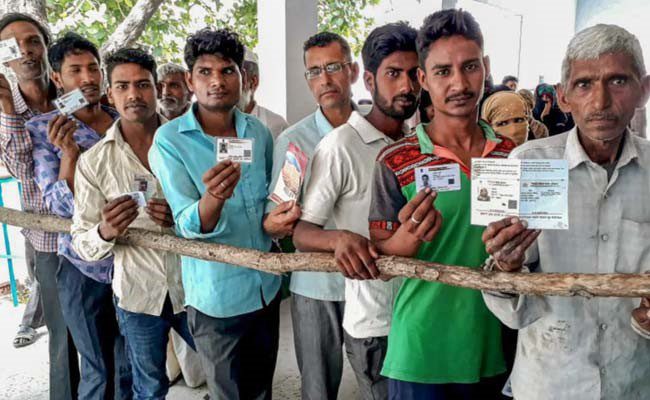The results of the by-elections clearly imply that the people, especially the poor, Dalits and minorities across the country have polarised to protect the secular ethics of the country. The recent uprising of the extremely poor and Dalits even in the states of Uttar Pradesh and Gujarat makes it clear that secularism, self-respect, and fundamental rights are more important to people than the freebies doled out by the Modi government. A report, for Different Truths.
Attributing the defeat of the BJP in the by-elections to the anti-incumbency factor is nothing but a move to protect the party and Narendra Modi from further alienation and sullying. Anti-incumbency has always been a factor in deciding the fate of the ruling party, but in the case of the Modi government, it is not so relevant.
By raising the bogey of anti-incumbency an effort is being made to wash off the sins of Prime Minister Narendra Modi and his government. It is meant to divert peoples’ attention from the crimes and violence perpetrated by the saffron activists, who have pushed the country on the brink of disaster. Majoritarianism has endangered the secular values and forces.
The results of the by-elections clearly imply that the people, especially the poor, Dalits and minorities across the country have polarised to protect the secular ethics of the country. The recent uprising of the extremely poor and Dalits even in the states of Uttar Pradesh and Gujarat makes it clear that secularism, self-respect, and fundamental rights are more important to people than the freebies doled out by the Modi government.
The verdict of the people of Kairana is the best example. The region in recent past witnessed the worst kind of communal riots. A large number of both Hindus and Muslims had to flee the area. But the moment they got the first opportunity, they voted out the BJP. What is quite significant is that the Jats voted for the RLD Muslim and the victory acquires more importance for the reason that RLD had suffered erosion in its support base after the Muzaffarnagar riots of 2013.
A closer look at the result implies that it was their concern for survival, rather than anti-incumbency, that made people vote for the RLD candidate. It also indicates the ascendance of political economy in defining and shaping the electoral process.
Three successive defeats in UP, one in the eastern sector, second in the middle and now Kairana in the western region, underline the consistent erosion in the support base of the BJP. Disillusioned with the functioning of Modi and Amit Shah, people are going back to the old equations.
The Uttar Pradesh alliance began to take shape with the BSP backing SP in the Phulpur and Gorakhpur Lok Sabha by-polls and SP agreeing to transfer its surplus votes to BSP for the 10th Rajya Sabha seat in U.P. The BJP, which had decided to make a bid to win the 10th seat despite not having the requisite numbers, however, succeeded to defeat the BSP candidate for this seat.
If the run-up to 2014 saw BJP add some allies, like the Lok Jana Shakti Party and Telugu Desam Party to the NDA ranks, the run-up to 2019 may well be witnessing an opposite trend of Opposition consolidation to keep the BJP out in key states.
The Sushasan Babu of Bihar, Nitish Kumar, also could not salvage the situation for the BJP and his nominee in Jokihat assembly seat lost miserably. The JD (U), the BJP’s ally in Bihar, lost to the RJD, signalling erosion in the support base of Nitish Kumar. Jokihat in Araria district had gone with the JD(U) since the Assembly polls in February 2005; victory for RJD’s Shahnawaz Alam has broken Nitish Kumar’s four-election hold on the seat.
This second defeat in two and a half months suggests that Nitish is losing the support base that helped him and the NDA do well in both Assembly and Lok Sabha elections in the Seemanchal region over the past several years. For young Tejashwi Yadav, the result is proof of his increasing acceptability among voters and party workers as Lalu Prasad’s political heir.
Tejashvi has attributed the victory to Laluvaad (Lalu’s ideology) over avsarvaad (opportunism). He said that the victory margin was a “clear indication for Nitishji and the NDA that people will teach them a lesson because they have insulted the people’s mandate”.
No ruling party in Bihar had been defeated by such a big margin before. It is the same seat with 70 percent Muslim population that Nitish had won with BJP’s support in 2005 and 2010, and with the RJD’s backing in 2015. Thursday’s rout came despite Nitish campaigning in Jokihat. He has already hinted at BJP’s communal politics for the defeat.
Mamata Banerjee’s TNC has not only won Maheshtala, it has picked up a massive 58% of the votes. Maheshtala has a Muslim population of 41%. It appears that Muslims have solidly backed the party. This is a threat of the BJP-RSS and increasing marginalisation of the CPM and Congress.
No doubt the time has come for the Opposition to strike decisively if they wish to survive. They ought to resolve to bury their differences. In fact, Lalu Prasad had shown this path in 2015, when he buried his rivalry with Nitish Kumar to form the Mahagathbandhan (grand alliance).
Arun Srivastava
©IPA Service
Photo from the Internet





 By
By
 By
By
